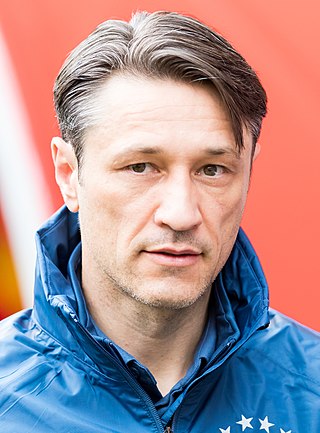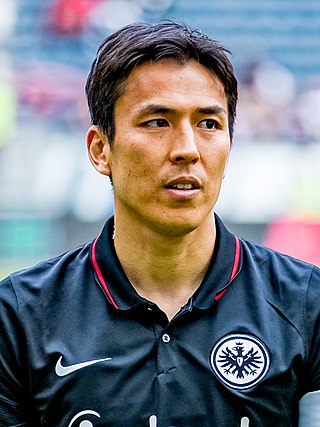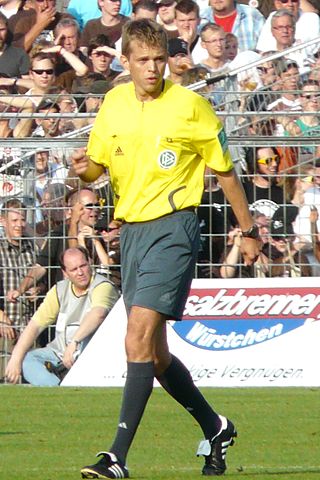
Niko Kovač is a professional football coach and former player.

Andreas Möller is a German former professional footballer who played as an attacking midfielder. He is the head of the youth department at Eintracht Frankfurt.

Bruno Edmund Pezzey was an Austrian professional footballer who played as a defender.

Makoto Hasebe is a Japanese former professional footballer who is the currently assistant coach of Japan national team. who played as a centre-back or defensive midfielder. He is also a former international player and captain of the Japan national team.
Richard Kress was a German footballer.

Ronald Brunmayr is an Austrian football manager and a former player who is currently the assistant manager at Premier League club Crystal Palace.

Adolf "Adi" Hütter is an Austrian professional football coach and former player who is the head coach of Ligue 1 club Monaco.

Oliver Glasner is an Austrian professional football manager and former player who is the manager of Premier League club Crystal Palace.

Sebastian Rode is a German former professional footballer who played as a midfielder.

Martin Hinteregger is an Austrian footballer who for Austrian Bundesliga club Austria Klagenfurt. A centre-back renowned for his aerial ability, Hinteregger gained a cult following among fans and was referred to as Hinti.

Danny Blum is a German professional footballer who plays as a winger for sixth-tier Verbandsliga Südwest club TSG Pfeddersheim. He plays mainly as a winger but also can play as a forward.

Nicolai Müller is a former German professional footballer who currently coaches Bulls FC Academy in the NSW NPL League One.

Jochen Herbert Drees is a former German football referee who is based in Münster-Sarmsheim. He refereed for SV Blau Weiß Münster-Sarmsheim of the Southwest German Football Association.
The 2017–18 DFB-Pokal was the 75th season of the annual German football cup competition. Sixty-four teams participated in the competition, including all teams from the previous year's Bundesliga and the 2. Bundesliga. The competition began on 11 August 2017 with the first of six rounds and ended on 19 May 2018 with the final at the Olympiastadion in Berlin, a nominally neutral venue, which has hosted the final since 1985. The DFB-Pokal is considered the second-most important club title in German football after the Bundesliga championship. The DFB-Pokal is run by the German Football Association (DFB).
The 2018–19 DFB-Pokal was the 76th season of the annual German football cup competition. Sixty-four teams participated in the competition, including all teams from the previous year's Bundesliga and the 2. Bundesliga. The competition began on 17 August 2018 with the first of six rounds and ended on 25 May 2019 with the final at the Olympiastadion in Berlin, a nominally neutral venue, which has hosted the final since 1985. The DFB-Pokal is considered the second-most important club title in German football after the Bundesliga championship. The DFB-Pokal is run by the German Football Association (DFB).

The 2018 DFB-Pokal Final decided the winner of the 2017–18 DFB-Pokal, the 75th season of the annual German football cup competition. The match was played on 19 May 2018 at the Olympiastadion in Berlin.

The 2019 DFB-Pokal Final decided the winner of the 2018–19 DFB-Pokal, the 76th season of the annual German football cup competition. The match was played on 25 May 2019 at the Olympiastadion in Berlin.
The 2020–21 DFB-Pokal was the 41st season of the annual German football cup competition. Several teams participated in the competition, including all teams from the previous year's Frauen-Bundesliga and the 2. Frauen-Bundesliga, excluding second teams. The competition began on 19 September 2020 with the first of six rounds and ended on 30 May 2021 with the final at the RheinEnergieStadion in Cologne, a nominally neutral venue, which has hosted the final since 2010. The DFB-Pokal is considered the second-most important club title in German women's football after the Bundesliga championship. The DFB-Pokal is run by the German Football Association (DFB).
The 1981–82 Hamburger SV season was the 35th season in the club's history and the 19th consecutive season playing in the Bundesliga.
The 2022–23 DFB-Pokal was the 80th season of the annual German football cup competition. Sixty-four teams participated in the competition, including all teams from the previous year's Bundesliga and 2. Bundesliga. The competition began on 29 July 2022 with the first of six rounds and ended on 3 June 2023 with the final at the Olympiastadion in Berlin, a nominally neutral venue, which has hosted the final since 1985. The DFB-Pokal is considered the second-most important club title in German football after the Bundesliga championship. The DFB-Pokal is run by the German Football Association (DFB).














